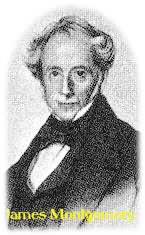
|
|
 |
|
|

James Montgomery
(1771-1854)
|
James Montgomery was born November 4, 1771 in Irvine, Ayrshire, Scotland where his father John was a minister in the Moravian Church. When Montgomery was five years old, his family moved to the Moravian settlement at Gracehill, near Ballymena, County Antrim. In 1783, his parents were sent off to the West Indies as missionaries leaving him at the Moravian settlement at Bracehill near Ballymena, County Antrim, Ireland where his education started. At the age of seven, he was sent off to begin his seminary training at Fulneck Seminary, Yorkshire, and while there made a public profession of religion by uniting with the Moravian Church. Not long after they had gone, his parents died; his father is buried in Barbados, and his mother in Tobago. At Fulneck, secular poetry and fiction were banned, but James nevertheless found means of borrowing and reading a good deal of poetry, including Burns' "Lines To A Mountain Daisy." He began to write his own poetry, and as a boy planned to write two epics in the Miltonic mode. His scholastic record at Fulneck was insufficient and in 1787 he was then apprenticed to a bakerin a shop in Mirfield, near Wakefield, a work that did not suit him at all. However, he stuck it out for 18 months in Muirfield. A similar position in Wath near Rotherham, convinced him to look elsewhere for livelihood and fulfillment. A trip to London, hoping to find a publisher for his youthful poems, ended in failure. He supported himself precariously and dubiously until 1792 when he became assistant to Mr. Gales, auctioneer, bookseller, and printer of the Sheffield Register. In 1794, Gales left England to avoid political prosecution. Montgomery took the Sheffield Register in hand, changed its name to the Sheffield Iris, and continued to edit it for 32 years. During the next two years he was imprisoned twice in the Castle of York. He was first imprisoned for six months for reporting on a riot in Sheffield and again for three months for commemorating the fall of the Bastille with a poem entitled the Fall of the Bastille (which he only published, and did not write). In 1797 he published a volume of poems, Prison Amusements, so named because some were written during his prison stay. In 1825, he lost The Sheffield Iris and founded and became contributor to The Eclectic Review; Montgomery was also a a strong Abolitionist. In his youth, he had strayed from the church, but at his own request he was readmitted into the Moravian congregation at Fulneck when forty-three years of age. He expressed his feelings at the time in the following lines People of the living God, Thereafter he became an avid worker for missions and an active member of the Bible Society. About the same time, the English Church Missionary Society and the Baptist Mission Society had formed, evangelism in England was an idea whose time had come and it is apparent in Montgomery's hymns. Moreover the English Moravian church traces its roots back to the Moravian Missionary center in Hernnhut, Germany (Moravians were also known as Hernnhuters or the Bohemian Brethren); it was a Moravian society that sent James' parents to the West Indies. He wrote 400 hymns in his career, approximately 100 are still in use; the more recognizable, in addition to Hail To the Lord's Anointed might be Angels From the Realms of Glory, Come to Calvary's Holy Mountain,. Go to Dark Gethsemane, Prayer is the Souls' Sincere Desire, In the Hour of Trial, Lift Up Your Heads, Ye Gates of Brass and For Ever with the Lord. His hymns were published in three volumes: Songs of Zion: Being Imitations of Psalms, 1822; The Christian Psalmist, 1825 (103 of his hymns) and Original Hymns for Public, Private and Social Devotion, 1853. In The Christian Psalmist, he is said to have laid the foundations of modern scientific hymnology, when he discussed with considerable insight the characteristics of the great English hymn writers who had preceded him. Although he was described as a generally kindly person, he could exhibit occasional sarcasm, as was the case in the following descriptions of some of his predecessors: They have begun apparently with the only idea in their mind at the time; another with little relationship to the former has been forced upon them by a refractory rhyme; a third, because necessary to eke out a verse; a fourth, to begin one; and so on. By contrast, Montgomery's hymns are described as "one central creative thought, shaping for itself melodious utterance, and with every detail subordinate to its harmonious presentation." Montgomery also wrote secular poetry, lecturing at the Royal Institution. The lectures were then published under the title Lectures on Poetry and General Literature in 1833; later in life, 1883, he was awarded a Royal Pension of £200 per annum [one source gives the figure of $1,000 per year], presumably to atone for his earlier imprisonments. Montgomery also published a volume of poems, many of which denounced the practice of slavery. His poems brought him considerable popularity, especially his Wanderer of Switzerland, which contains one of his finished productions: The Grave. The Edinburgh Review severely criticized it, but Blackwood gave it a favorable review, as did the poet Byron. He was once asked which of his poems would live. He replied: "None, sir, nothing except perhaps a few of my hymns." In his later years, he occupied himself with the promotion of philanthropic and religious movements, earning the almost universal esteem of the citizens of Sheffield. He never married and died quietly in his sleep, a day after he had written his last hymn, April 30, 1854 at age 83, at his home in Sheffield where his career and works accorded him the honor of a public funeral in that city. In his memory, a statue was erected in the Sheffield cemetery, a stained glass window was installed in the parish church, and a public hall was named after him. James Montgomery is the hymn writer who sounded the "first... missionary note in English hymnody" (Ryden, p. 316). The poetry of Montgomery's hymns is simple in vocabulary and structure and uses imagery in a very powerful way. In his hymn, "Prayer is the Soul's Sincere Desire," (The Methodist Hymnal, 1966), he uses imagery of fire, sigh, tear; he contrasts "infant speech" and "sublimest strain." In an ironic twist, prayer is the "breath" of the dying one, by which he is ushered into the presence of God. Original Hymns for Public, Private and Social Devotion, 1853
Hymns: According to Thy Gracious Word Angels from the Realm of Glory Be Known to Us in Breaking Bread Call Jehovah Thy Salvation Come to Calvary's Holy Mountain Go to Dark Gethsemane God Is My Strong Salvation Hail to the Lord's Anointed How Beautiful the Sight In the Hour of Trial In Time of Tribulation Lift Up Your Heads, Ye Gates of Brass Lord Is My Shepherd, The O Spirit of the Living God Prayer Is the Soul's Sincere Desire Songs of Praise the Angels Sang Stand Up and Bless the Lord To Thy Temple I Repair His works include: Prison Amusements, 1797 The Wanderer of Switzerland, 1806 The West Indies, 1807 The World Before the Flood, 1813 Greenland and Other Poems, 1819 Songs of Zion, 1822 The Christian Psalmist, 1825 The Christian Poet, 1825 The Pelican Island, 1828 The Poet's Portfolio, 1835 |
 |
 |
 |
 |
 |
 |